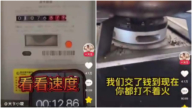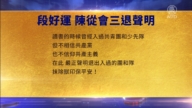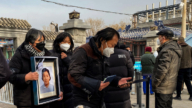【新唐人2012年10月9日訊】明年7月份將開始實施的《出境入境管理法》明確規定,定居國外的中國公民要回國定居,必須提前申請,經過批准方可入境。這引來民眾和專業人士的質疑與批評。有分析認為,當局這一規定,可能試圖限制一些中共不喜歡的人回國。
今年6月,中共第十一屆全國人大常務委員會批准通過了新的《出境入境管理法》。這一新法的第二章第十三條規定:定居國外的中國公民要求回國定居,應當在入境前向駐外使館、領館或者外交部委託的其他駐外機構提出申請,也可以由本人或者經由國內親屬,向擬定居地的縣級以上地方人民政府僑務部門提出申請。
對比發現,1994年大陸當局發佈的《出入境管理法實施細則》第三章第十條也有類似規定,只不過在經由國內親屬申請的情況下,老的規定要求向公安局提出申請,而新的規定則變為向隸屬中共統戰部的僑務部門申請。
新的《出境入境管理法》對這一規定的保留,使眾多定居海外的中國公民感到費解和不可思議。
網友批駁:太無理了,等於變相可以剝奪公民身份,全世界沒有這樣的事!
但也有網友非常樂觀的說:“大家耐心等一等,共黨明年就要垮臺了,大家就好開開心心把家返啦。”
大陸律師張卉向《新唐人》表示,這一規定很奇怪。其他國家,比如加拿大,都沒有這種對本國公民的出入境限制。
大陸律師張卉:「你沒有入(外國)籍、你還是中國公民的時候,國家就這樣限制你的出入境的話,我覺得就很不正常。那也可能是這樣一種趨勢,你們走了的就不要再回來。但是也是不可能的,如果是基於這樣一個考慮的話,我覺得也是比較可笑、比較幼稚的。」
中國問題分析人士何岸全分析,這一規定似乎是當局要把海外中國公民當成外國人來對待。而中共這樣做的目地很可能一個是為了斂財,一個是為了「維穩」。
中國問題分析人士何岸全:「雖然你是中國公民,比如說很多海外流亡人士為了堅持民主運動,他們堅持不拿美國護照,拿中國護照。那麼它就為了防止這些人回國。我覺得從政治方面考量,可能在這方面也是屬於『維穩』的新的手段。」
目前定居美國的原大陸人士李先生也認為,從法律上講,這個規定有違反憲法的嫌疑。
原大陸人士李先生:「其實它還是要對人進行控制。中國自從49年以後實行戶口制度,一直對人實際上是一種控制。那中國人到海外之後它相對控制的比較少了,一回國,它又有機會了,又去控制。」
另一方面,民眾對這一條款具體如何執行,如何明確界定「甚麼是回國定居」等概念,感到費解。而有中共駐外領館工作人員在接受媒體詢問時也表示,對於這一新法規,領館目前還沒有接到相應的具體實施辦法。
採訪/劉惠 編輯/李謙 後製/君卓
Only Approved Overseas Chinese Citizens Can Return to China
From July 2013, any overseas Chinese citizens will have
to get prior official approval before returning to China to live.
The Chinese Communist Party (CCP) regime’s
new regulation has led to public doubt and criticism.
People are speculating that this may be the CCP’s
new way to restrict dissidents from entering China.
This June, CCP authorities approved a new regulation
for the immigration and emigration of Chinese citizens.
The law stipulates that Chinese citizens residing abroad,
but who want to return to China to live, need to apply
to CCP diplomatic units before they can enter the country.
It is similar to the 1994 version of the exit /entry regulation.
The difference is which department
is now making the decision of acceptance.
Previously, it was the Public Security Bureau, and
now it is the Overseas Chinese Affairs Department.
The Overseas Chinese Affairs Department works directly
under authority of the CCP United Front Work Department.
The new law maintains the stipulation that restricts Chinese
citizens’ entering China, which has perplexed the public.
A netizen criticized, “how unreasonable it is!
It amounts to depriving people of citizenship.
This happens nowhere else in the world!”
Another netizen wrote, “we just need a little
more patience until the CCP collapses in 2013.
Then we’ll be able to return home, happily.”
Chinese lawyer Zhang Hui thinks
the stipulation is very strange.
In other democratic countries like Canada, there
are no exit/entry controls over its own citizens.
Zhang Hui: “I think it’s irrational to restrict
Chinese citizens’ entering and leaving China.
It may be the regime’s logic that since you
have left China, you won’t be welcomed back.
But this is unreasonable and absurd thinking, in my mind.”
Political observer He Anquan comments that this
regulation seems to treat overseas Chinese as foreigners.
Behind it, the motives of the CCP authorities
may be to collect money and to 『maintain stability’.
He Anquan: “For example, many overseas Chinese
exiles still hold People’s Republic of China passports, for the sake of democratic movement.
They’re the targets that are blocked
from entering China by the regime.
This can be viewed as a new tactic for 『stability preservation.”
Mr. Li from mainland China is now living in the U.S.
He thinks that the regulation is against China’s constitution.
Mr. Li: “In essence, it still aims to control the people.
In 1949, the Hukou system (forced family
registration) was promulgated across China.
The regime has long controlled Chinese people until today.
By contrast, the overseas Chinese are beyond its reach.
Thus, it sees the time when overseas Chinese return
to China as a chance to continue its control.”
The issue of how to implement this new regulation,
and how to define the concept of “settle in China", has also puzzled the public.
Staff of CCP diplomatic units stated in interview that they
have not yet received specific measures for implementation.



























